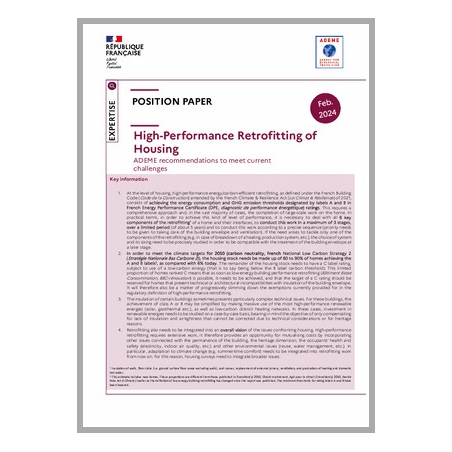Avis d'expert sur la rénovation performante des logements
Position de l'ADEME
Mis en ligne le : 23/05/2024

ADEME recommendations to meet current challenges
Housing accounts for 30% of the final energy consumption in France, representing 10% of greenhouse gas emissions. To achieve carbon neutrality by 2050, the current pace of energy consumption reduction and housing decarbonization must accelerate significantly. At the housing level, effective renovation, as defined in the Construction Code modified by the 2021 Climate and Resilience Law, involves reaching the energy consumption and greenhouse gas emission thresholds of categories A and B in the Energy Performance Diagnosis (DPE). However, as of 2024, only 6% of French homes are classified as A or B. To meet the set objectives, the housing stock should consist of 80 to 90% of homes classified as A or B in the DPE. Thus, comprehensive renovation is essential, often requiring substantial work. In response to the abundance of information in this field, ADEME (the French Environment and Energy Management Agency) highlights best practices for achieving energy-efficient housing renovations and strengthening the industry…
Housing accounts for 30% of the final energy consumption in France, representing 10% of greenhouse gas emissions. To achieve carbon neutrality by 2050, the current pace of energy consumption reduction and housing decarbonization must accelerate significantly. At the housing level, effective renovation, as defined in the Construction Code modified by the 2021 Climate and Resilience Law, involves reaching the energy consumption and greenhouse gas emission thresholds of categories A and B in the Energy Performance Diagnosis (DPE). However, as of 2024, only 6% of French homes are classified as A or B. To meet the set objectives, the housing stock should consist of 80 to 90% of homes classified as A or B in the DPE. Thus, comprehensive renovation is essential, often requiring substantial work. In response to the abundance of information in this field, ADEME (the French Environment and Energy Management Agency) highlights best practices for achieving energy-efficient housing renovations and strengthening the industry…
Documents associés
Position de l'ADEME
Mis en ligne le : 23/05/2024
Position Paper - High-Performance Retrofitting of Housing